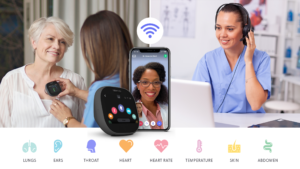Caring for critically ill children at home
Posted: 26th February 2021
This week, in support of the Child Health Technology Conference on 2-5th March, we have been shining a spotlight on companies that have innovative solutions to help transform children’s health. In this article, we learn about Tytocare, a handheld medical device that is being used remotely to improve the health and wellbeing of children.
What is TytoCare?
 TytoCare is a handheld medical device that can be used remotely to diagnose a range of acute conditions. There are two types of device: TytoHomeTM and TytoProTM
TytoCare is a handheld medical device that can be used remotely to diagnose a range of acute conditions. There are two types of device: TytoHomeTM and TytoProTM
- TytoHomeTM can be used remotely by patients, families and carers
- TytoProTM can be used by healthcare professionals to capture data directly from the patient.
It can be used in two ways: in an offline exam – where data is captured and stored for review by a clinician later on and an online exam – where data is captured and shared via a live video consultation with a healthcare professional.
First pilot site in Yorkshire and the Humber – and the UK
In Yorkshire and the Humber, TytoCare was first piloted at Bradford Teaching Hospitals Trust in 2019. The initial pilot involved 16 children between 6 weeks and 16 years old and compared a traditional clinical examination with use of the TytoCare device. Findings showed that the device allowed clinicians to identify the same clinical findings remotely as they had done face to face.
In spring 2020, the COVID-19 pandemic changed the focus of the next phase of the pilot. Instead of focusing on streaming between primary and secondary care, the focus was on two groups of children and young people who need frequent support from the multi-disciplinary team at the hospital but who were also more at risk of severe illness with a COVID-19 infection. These children and young people either have a life-limiting illness and are looked after by the paediatric palliative care team or a chronic condition like Cystic Fibrosis under the care of the paediatric respiratory team.
During the second phase, the teams used the device in two ways:
1) A device with the specialist nurse from each team to allow for a remote medical review when needed, for example when visiting an unwell patient at home or a patient on outpatient intravenous antibiotics.
2) Devices for families.
An added benefit of the device is greater efficiency and time savings for healthcare professions. For Bradford, which is a Trust with two sites: one with the children’s outpatient department and one where the children’s ward and consultants are based, this reduced the need for doctors to travel between sites, as well as reducing the number of home visits.
Families were also given the device, and this enabled children to have access to a variety of healthcare services, in the comfort of their own home. In the case of children with chronic lung problems, regular physiotherapy is an essential part of their care and the device enabled physiotherapists to support this by checking technique and its effectiveness by using the device to listen to their chest remotely.
Megan Dale, Paediatric Leadership Fellow and Clinical Lead for the TytoCare Project, at Bradford Teaching Hospitals Trust said:
“For me one of the biggest successes of the pilot has been seeing the impact on families. Caring for a child or young person, and sometimes more than one, with a chronic or life limiting illness is really hard and our families do an amazing job juggling lots of things. The device gave them reassurance that we could review their child at home either routinely or if they were unwell regardless of the pandemic. Lots of families do not have easy access to transport and some have to get on more than one bus to make a hospital appointment, which also means missing more time at school and travelling can be very uncomfortable for some of our children especially those who have problems with mobility. The remote ability of the device means children and their families still have access to healthcare in real-time while making things slightly easier for the whole family.
We also designed our pilot to be digitally inclusive. We focused on children based on clinical need; it didn’t matter whether they had access to a phone or tablet to pair with the device, internet connectivity or the skills to use these technologies; we found solutions for all of these things. I think it’s so important that any new digital technology project is designed so everyone can access it, no matter their circumstances.”
Adoption and spread in Yorkshire and the Humber
A new NHSX funded joined up care programme has been launched to accelerate the uptake of digital innovations to transform patient care by supporting the use of remote technology to reduce hospital admissions.
The Yorkshire & Humber AHSN is working with our three integrated care systems to support the use and adoption of this innovative technology across a range of services in both children and adults. Alongside the AHSN, we are delighted to work with partners including mHabitat and the NIHR Children and Young People MedTech Cooperative on this exciting programme.
Next Steps
Together with the Yorkshire & Humber AHSN, health and social care organisations across the region are holding project meetings to scope and develop plans for using the TytoCare devices We hope to share more information on these sites and pathways over the coming weeks, and are really thrilled about the potential to positively change the lives of those families living in our region who may benefit from this technology.
Find out more about TytoCare
Get in touch with us about our Joined-Up Care Programme
